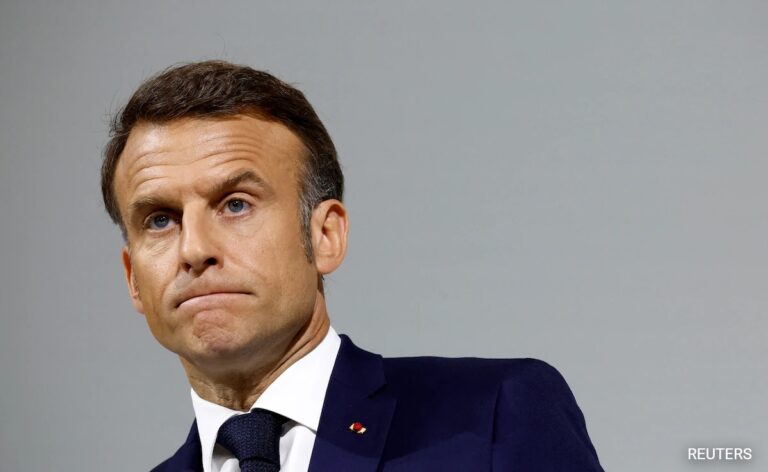France’s far right was aiming for a historic chance on Sunday to form a government and claim the prime minister’s post after winning the first round of legislative elections, with President Emmanuel Macron’s centrist forces coming in third.
But it remains to be seen whether Marine Le Pen’s National Rally (RN) will win an absolute majority of seats in the National Assembly in the second round on July 7. That is what it would need to be sure of taking power and for Marine Le Pen’s protégé, Jordan Bardella, 28, to become prime minister.
Macron had stunned the nation and disconcerted even some allies by calling early elections after the RN defeated his centrist forces in European Parliament elections this month.
But that gamble risks backfiring, as Macron’s alliance is now expected to win a much smaller minority contingent in parliament. That would make the president a much less powerful figure for the remaining three years of his term.
Projections from major French polling firms give the RN 33.2 to 33.5 percent of the vote, compared to 28.1 to 28.5 percent for the left-wing New Popular Front alliance and 21.0 to 22.1 percent for Macron’s centrist camp.
Pollsters estimated that the RN would thus obtain the majority of seats in the National Assembly, which has 577, at the end of the second round. But it was far from certain that the party would obtain the 289 seats needed for an absolute majority.
Projections vary widely, with Ipsos predicting 230 to 280 seats, Ifop 240 to 270 and Elabe being the only organisation to place it in the range of an absolute majority with 260 to 310 seats.
In a statement, Macron called for a “broad” alliance against the far right in the second round, which will see second-round elections take place in which there was no outright winner in the first round.
The left-wing alliance and the president’s camp hope that tactical voting aimed at preventing RN candidates from winning seats will allow them to achieve an absolute majority.
French Prime Minister Gabriel Attal, who will likely be forced to resign after the second round, warned that the far right was now at the “gates of power”. The RN is unlikely to get a “single vote” in the second round, he said.
“We have seven days to spare France from a catastrophe,” said Raphaël Glucksmann, a key figure in the left-wing alliance.
“Prime Minister of all French people”
As the French face the most polarizing choices in recent history, turnout has soared to 65 percent, well above the 2022 poll turnout of just 47.5 percent.
Macron said the high turnout in the first round demonstrated “the importance of this vote for all our compatriots and the desire to clarify the political situation.”
The arrival in government of the RN, anti-immigration and eurosceptic, would constitute a turning point in the modern history of France and would be the first time that a far-right force had taken power in the country since the Second World War, then occupied by Nazi Germany.
“Nothing is won and the second round is decisive,” Le Pen, who has long worked to distance the party from its extremist origins, told supporters.
“We need an absolute majority for Jordan Bardella to be appointed Prime Minister in eight days by Emmanuel Macron.”
Bardella said he wanted to be the “prime minister of all French people.”
This would create a tense period of “cohabitation” with Macron, who has pledged to serve out his mandate until 2027.
Bardella said he would only form a government if the RN won an absolute majority in the elections.
“Heavy defeat”
The alternative is months of political paralysis and negotiations to find a solution for a lasting government that can survive votes of no confidence.
Far-left leader Jean-Luc Mélenchon said Macron’s centrist alliance had suffered a “heavy and indisputable” defeat in the snap elections.
Risk analysis firm Eurasia Group estimates that the RN will probably fail to obtain an absolute majority. France will find itself “at least 12 months with a blocked National Assembly and, at best, a technocratic government of “national unity” with a limited capacity to govern,” it adds.
Macron’s decision to call an early vote has sparked uncertainty in Europe’s second-largest economy. The Paris stock market suffered its biggest monthly decline in two years in June, falling 6.4%, according to figures released Friday.
The unrest also risks undermining Macron’s stature as an international leader playing a leading role in helping Ukraine fight the Russian invasion. Immediately after the second round, he is scheduled to attend the NATO summit in Washington.
The daily newspaper Libération calls on voters to unite to stop the march of the extreme right. “After the shock, let’s stand together,” the daily wrote on its front page on Monday.
(Except for the headline, this article has not been edited by NDTV staff and is published from a syndicated feed.)
Featured video of the day
When Shweta Tripathi Sharma “almost” landed a role in a series with Nicole Kidman


